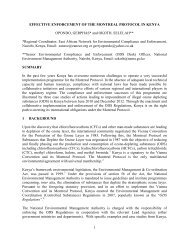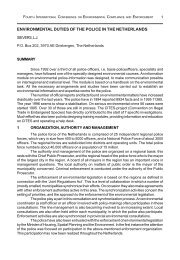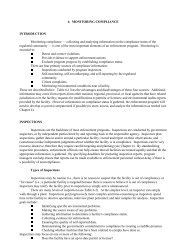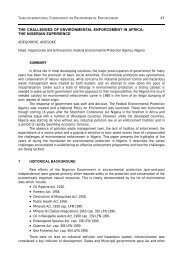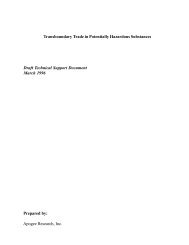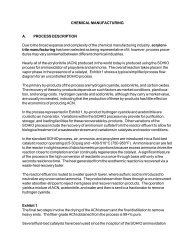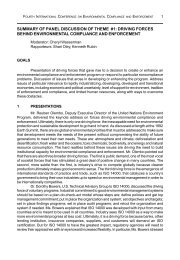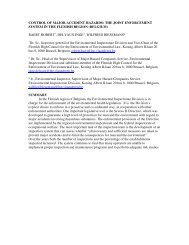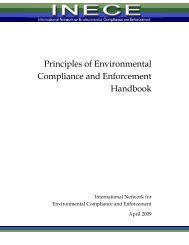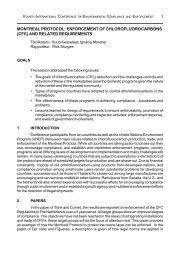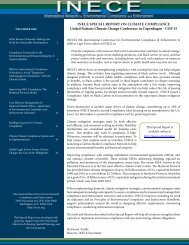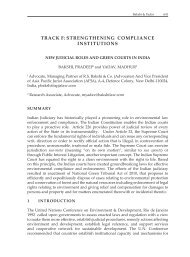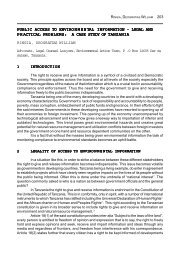Eze, Chukwuka N., The Probo Koala Incident in Abijan, Côte ... - Inece
Eze, Chukwuka N., The Probo Koala Incident in Abijan, Côte ... - Inece
Eze, Chukwuka N., The Probo Koala Incident in Abijan, Côte ... - Inece
Create successful ePaper yourself
Turn your PDF publications into a flip-book with our unique Google optimized e-Paper software.
<strong>Eze</strong> 351<br />
THE PROBO KOALA INCIDENT IN ABIJAN CÔTE D’IVOIRE: A CRITIQUE<br />
OF THE BASEL CONVENTION COMPLIANCE MECHANISM<br />
EZE, CHUKWUKA N. LLM (DALHOUSIE) 1<br />
1<br />
Secretariat of the Basel Convention, United Nations Environment Programme,<br />
Geneva, Switzerland.<br />
SUMMARY<br />
<strong>The</strong> alarm<strong>in</strong>g rate of illegal dump<strong>in</strong>g of hazardous wastes witnessed <strong>in</strong> the<br />
late 1980s appeared to have been checked <strong>in</strong> the early 1990s by the adoption<br />
and subsequent entry <strong>in</strong>to force of the Basel Convention and some regional<br />
<strong>in</strong>struments on the subject. <strong>The</strong> <strong>Probo</strong> <strong>Koala</strong> <strong>in</strong>cident <strong>in</strong> Abidjan, Cote d’Ivoire <strong>in</strong><br />
August 2006, however, has brought to the remembrance of the global community<br />
the harsh health and environmental consequences of this unwholesome practice.<br />
More importantly, it constitutes a litmus test for the exist<strong>in</strong>g <strong>in</strong>struments,<br />
reveal<strong>in</strong>g their strengths and weaknesses. Thus, aga<strong>in</strong>st the background of<br />
the <strong>Probo</strong> <strong>Koala</strong> <strong>in</strong>cident, this paper undertakes a critical analysis of the Basel<br />
Convention compliance mechanism, identify<strong>in</strong>g <strong>in</strong>adequacies <strong>in</strong> the mandate of<br />
the Basel Secretariat and the poor exchange of <strong>in</strong>formation requirements under the<br />
Convention as major contributors to the Cote d’Ivoire tragedy.<br />
1 INTRODUCTION<br />
<strong>The</strong> dump<strong>in</strong>g of hazardous wastes <strong>in</strong> Abidjan, Cote d’Ivoire <strong>in</strong> August 2006<br />
by the tanker - <strong>The</strong> <strong>Probo</strong> <strong>Koala</strong> (here<strong>in</strong>after “the <strong>Probo</strong> <strong>Koala</strong> <strong>in</strong>cident”) has<br />
brought to the limelight, not only the thriv<strong>in</strong>g bus<strong>in</strong>ess of transboundary<br />
movement of hazardous wastes around the world, but also the adverse health and<br />
environmental implications of this <strong>in</strong>famous trade. 1 It has also brought to light<br />
<strong>in</strong>stitutional and operational deficiencies, as well as a drastic lack of capacity of a<br />
large number of countries to manage waste <strong>in</strong> an environmentally sound manner. 2<br />
It questions the effectiveness of the exist<strong>in</strong>g relevant <strong>in</strong>ternational <strong>in</strong>struments <strong>in</strong><br />
combat<strong>in</strong>g this trade around the world, particularly from the developed to the<br />
develop<strong>in</strong>g countries, and underscores the questionable nature of the parties’<br />
compliance with the regulatory <strong>in</strong>struments. Recogniz<strong>in</strong>g this fact, the former<br />
Executive Secretary of the Basel Secretariat, Mrs. Kuwabara-Yamamoto stated that:<br />
One of the important lessons from the situation <strong>in</strong> Abidjan is that we have a<br />
serious problem with enforcement. National and <strong>in</strong>ternational laws are <strong>in</strong> place to<br />
regulate these exports, but problems arise because of the lack of legal and technical<br />
<strong>in</strong>stitutional capacity <strong>in</strong> many develop<strong>in</strong>g countries to monitor traffic across their<br />
borders. Strengthen<strong>in</strong>g the enforcement capacity of the Parties will therefore<br />
rema<strong>in</strong> a priority for the Basel Convention <strong>in</strong> years to come 3
352 Eighth International Conference on Environmental Compliance and Enforcement 2008<br />
Furthermore, besides reveal<strong>in</strong>g cracks <strong>in</strong> the current structure of <strong>in</strong>ternational<br />
environment governance, 4 the <strong>in</strong>cident specifically questions the efficacy of the<br />
Basel Convention on the Control of the Transboundary Movements of Hazardous<br />
Wastes and their Disposal (“the Basel convention”) 5 <strong>in</strong> fulfill<strong>in</strong>g its mandate of<br />
protect<strong>in</strong>g human health and the environment aga<strong>in</strong>st the adverse effects of the<br />
generation, transboundary movements and management of hazardous wastes.<br />
In light of the <strong>Probo</strong> <strong>Koala</strong> <strong>in</strong>cident, this paper undertakes a critical analysis of<br />
the Basel Convention compliance mechanism. In order to address the relevant<br />
issues raised by the subject, the paper is divided <strong>in</strong>to five parts. Part II provides<br />
an account of the <strong>Probo</strong> <strong>Koala</strong> <strong>in</strong>cident and Part III discusses the exist<strong>in</strong>g<br />
compliance mechanism under the Basel Convention. Part IV critically assesses<br />
the Basel Compliance mechanism aga<strong>in</strong>st the events of the <strong>Probo</strong> <strong>Koala</strong>. Part V<br />
concludes the discussion, mak<strong>in</strong>g recommendations for improv<strong>in</strong>g the compliance<br />
mechanism of the Basel Convention.<br />
2 THE PROBO KOALA INCIDENT<br />
<strong>The</strong> series of events which culm<strong>in</strong>ated <strong>in</strong> the Cote d’Ivoire tragedy began when<br />
a Korean-built, Greek-managed, but Panamanian-flagged tanker chartered by the<br />
multibillion dollar (euro) Dutch commodities trad<strong>in</strong>g company Trafigura Beheer BV<br />
(“Trafigura”) docked <strong>in</strong> Amsterdam to discharge its load on 2 July 2006. As the ship<br />
discharged a portion of its cargo <strong>in</strong> a barge that was moored alongside the ship, a<br />
west w<strong>in</strong>d carried its sharp stench <strong>in</strong>to nearby residential neighborhoods, where<br />
residents notified the police. “This is the worst stench we have ever experienced<br />
here,” said an employee of Amsterdam Port Services, a waste disposal company. 6<br />
Amsterdam Port Services took a sample of the black substance from one of the<br />
tanker’s tanks. Though declared as “waste water” used to clean gasol<strong>in</strong>e shipp<strong>in</strong>g<br />
tanks, chemical analysis told a different story. <strong>The</strong> hydrocarbons <strong>in</strong> the material<br />
conta<strong>in</strong>ed high concentrations of mercaptan, a substance which is highly toxic and<br />
odorous <strong>in</strong> high concentrations. 7 After an analysis of the residues, it was decided<br />
that the disposal operation required the use of specialist facilities <strong>in</strong> Rotterdam<br />
and would cost <strong>in</strong> the range of Euros 250,000 – 300,000 and not Euros 19,000 as<br />
orig<strong>in</strong>ally envisaged, due to the high toxicity of the waste. Trafigura stopped the<br />
discharge of the residues, refus<strong>in</strong>g Amsterdam Port Services’ new quotation for the<br />
disposal of the slops. <strong>The</strong> slops were reloaded on the <strong>Probo</strong> <strong>Koala</strong> and the tanker<br />
left with the consent of the Amsterdam Port Authorities. Trafigura assured the Port<br />
Authorities that the residues would be managed safely elsewhere.<br />
Three days later, the <strong>Probo</strong> <strong>Koala</strong> set sail to Estonia. Amsterdam port officials sent<br />
an urgent message to their counterparts <strong>in</strong> Paldiski, an Estonian port, <strong>in</strong>form<strong>in</strong>g<br />
them that a ship with a “suspicious cargo” was headed their way. Thus, the <strong>Probo</strong><br />
<strong>Koala</strong> was unable to get rid of its ‘chemical soup’ <strong>in</strong> Paldiski, where it took on a<br />
consignment of gasol<strong>in</strong>e bound for Africa. After unload<strong>in</strong>g the gasol<strong>in</strong>e <strong>in</strong> the<br />
port of Lagos, Nigeria, it arrived <strong>in</strong> Cote d’Ivoire <strong>in</strong> August. A company called<br />
Tommy, which had just been established <strong>in</strong> July, took delivery of the slop which
<strong>Eze</strong> 353<br />
the European ports had turned away. Ivorian officials and witnesses say more<br />
than a dozen trucks contracted by Tommy simply poured 528 tons of the waste at<br />
17 public sites around Abidjan after midnight of August 19. In the early hours of<br />
Monday 21 August 2006, residents of several parts of the district of Abidjan were<br />
awoken by a thick and suffocat<strong>in</strong>g smell. By morn<strong>in</strong>g, eyes were st<strong>in</strong>g<strong>in</strong>g, noses<br />
bleed<strong>in</strong>g, stomachs, chests and ears were ach<strong>in</strong>g. Tests later confirmed the sludge<br />
conta<strong>in</strong>ed mercaptans and hydrogen sulfide, a potent poison that, particularly<br />
<strong>in</strong> conf<strong>in</strong>ed spaces, can cause blackouts, respiratory failure and death. Alerted,<br />
the M<strong>in</strong>istry of Environment and Forestry mobilized its services whose <strong>in</strong>itial<br />
<strong>in</strong>vestigations led to the discovery of the dump<strong>in</strong>g of some substance on several<br />
sites of the district of Abidjan.<br />
<strong>The</strong> <strong>in</strong>cident evolved <strong>in</strong>to a crisis and a tragedy from sanitary, psychological,<br />
ecological and socio-economical perspectives. It led to massive displacement<br />
of residents liv<strong>in</strong>g near the dump sites, and violent public demonstrations<br />
throughout the district of Abidjan. In view of the magnitude of the crisis, the Prime<br />
M<strong>in</strong>ister and the Government resigned on 7 September 2006. A new Government<br />
was formed with the M<strong>in</strong>isters of Environment and Transport replaced by new<br />
<strong>in</strong>dividuals. <strong>The</strong> heads of the Customs Services, the Abidjan Harbour and the<br />
Governor of the District of Abidjan were all relieved of their duties. 8 Interest<strong>in</strong>gly,<br />
it has also led to an upsurge <strong>in</strong> calls for a reassessment of the compliance<br />
mechanism of the Basel Convention.<br />
3 THE BASEL CONVENTION COMPLIANCE MECHANISM<br />
Articles 4 and 6 of the Basel Convention impose obligations on parties to prevent<br />
pollution due to hazardous wastes. With the object of prevent<strong>in</strong>g the adverse<br />
health and environmental implications of hazardous wastes generation, movement<br />
and disposal, the Convention regulates the generation, movement and disposal<br />
of hazardous wastes. Adopt<strong>in</strong>g a preventive approach, the Convention enjo<strong>in</strong>s<br />
parties to take appropriate measures to ensure the reduction, to a m<strong>in</strong>imum, of<br />
the generation of hazardous wastes with<strong>in</strong> their territories, tak<strong>in</strong>g <strong>in</strong>to account<br />
social, technological and economic aspects. 9 It also requires parties to cooperate<br />
<strong>in</strong> the development and implementation of new low-waste technologies, with a<br />
view to elim<strong>in</strong>at<strong>in</strong>g, as far as practicable, the generation of hazardous wastes. 10 In<br />
regulat<strong>in</strong>g the transboundary movement of wastes, it prescribes the Prior Informed<br />
Consent procedure. 11 <strong>The</strong> Prior Informed Consent procedure imposes a duty<br />
on the state of export to notify the prospective states of import or transit, of any<br />
<strong>in</strong>tended transboundary movement of hazardous wastes. <strong>The</strong> state of export can<br />
either provide this <strong>in</strong>formation itself or require the generator or exporter to do so<br />
through the channel of its competent authority. 12 <strong>The</strong> state of import shall respond<br />
to the notifier <strong>in</strong> writ<strong>in</strong>g, either consent<strong>in</strong>g to the movement with or without<br />
conditions, or deny<strong>in</strong>g permission for the movement, or request<strong>in</strong>g additional<br />
<strong>in</strong>formation. 13 A copy of the f<strong>in</strong>al response of the state of import shall be sent to the<br />
competent authorities of the states parties concerned. In this regard, the state of<br />
export shall not allow the generator or exporter to commence the transboundary<br />
movement until it has received written confirmation that:
354 Eighth International Conference on Environmental Compliance and Enforcement 2008<br />
(a) <strong>The</strong> notifier has received the written consent of the state of import; and<br />
(b) <strong>The</strong> notifier has received from the state of import confirmation of the existence<br />
of a contract between the exporter and the disposer specify<strong>in</strong>g environmentally<br />
sound management of the wastes <strong>in</strong> question. 14<br />
More so, each state of transit is obligated to promptly acknowledge to the notifier<br />
receipt of the notification. It may subsequently respond to the notifier <strong>in</strong> writ<strong>in</strong>g,<br />
with<strong>in</strong> 60 days, consent<strong>in</strong>g to the movement with or without conditions, or<br />
deny<strong>in</strong>g permission for the movement, or request<strong>in</strong>g additional <strong>in</strong>formation.<br />
To this end, the state of export shall not allow the transboundary movement to<br />
commence until it has received the written consent of the state of transit. 15 When<br />
the waste f<strong>in</strong>ally arrives <strong>in</strong> the state of import, the Convention enjo<strong>in</strong>s parties to<br />
dispose of such wastes <strong>in</strong> an environmentally sound manner. This entails tak<strong>in</strong>g<br />
all practicable steps to ensure that the wastes are managed <strong>in</strong> a manner which will<br />
protect human health and the environment aga<strong>in</strong>st the adverse effects which may<br />
result from such wastes. 16<br />
In addition, the Convention obliges parties to take appropriate measures to ensure<br />
<strong>in</strong>ter alia: (a) the availability of adequate disposal facilities for the environmentally<br />
sound management of hazardous wastes; 17 (b) that the transboundary movement<br />
of hazardous wastes is reduced to the m<strong>in</strong>imum; 18 and (c) prevent the import<br />
of hazardous wastes if it has reason to believe that it will not be managed <strong>in</strong> an<br />
environmentally sound manner. 19<br />
4 THE PROBO KOALA INCIDENT AND THE BASEL CONVENTION<br />
COMPLIANCE MECHANISM: A CRITICAL ANALYSIS<br />
<strong>The</strong> sequence of events that precipitated the <strong>Probo</strong> <strong>Koala</strong> <strong>in</strong>cident reveals the<br />
<strong>in</strong>adequacies of the regulatory procedures/mechanism of the Basel Convention. As<br />
earlier noted, the tanker – <strong>Probo</strong> <strong>Koala</strong> carried the hazardous wastes from the port<br />
of Amsterdam to Paldiski, Estonia, and further down the road to the port of Lagos,<br />
Nigeria before its f<strong>in</strong>al dump<strong>in</strong>g <strong>in</strong> Abidjan, Côte d’Ivoire. I am persuaded that<br />
a more efficient <strong>in</strong>ternational regulatory framework would have <strong>in</strong>tercepted the<br />
waste <strong>in</strong> transit and averted the eventual disaster <strong>in</strong> Abidjan. <strong>The</strong>re are obvious<br />
weaknesses <strong>in</strong> the polic<strong>in</strong>g of parties’ compliance under the Basel Convention.<br />
Two areas of weakness that facilitated the Côte d’Ivoire tragedy are discussed <strong>in</strong><br />
this paper, namely, (1) the absence of the duty on parties to <strong>in</strong>form neighbour<strong>in</strong>g<br />
states of the presence of a vessel with hazardous wastes with<strong>in</strong> their region;<br />
and (2) the lack of supervisory role for the Basel Secretariat <strong>in</strong> waste shipments.<br />
It is noteworthy that these two are not the only areas of weakness <strong>in</strong> the Basel<br />
Convention, but the ones that provided a leeway for the <strong>Probo</strong> <strong>Koala</strong> <strong>in</strong>cident. 20<br />
4.1 Absence of the duty to <strong>in</strong>form<br />
<strong>The</strong> notification requirement under the Prior Informed Consent procedure, article<br />
13(1) of the Basel Convention obligates parties to <strong>in</strong>form other states which are
<strong>Eze</strong> 355<br />
likely to be affected by an accident which occurred dur<strong>in</strong>g the transboundary<br />
movement of wastes or their disposal. Clearly, this duty arises only after the<br />
occurrence of an accident, and the <strong>in</strong>formation should be given to states which<br />
are likely to be affected by the accident only. <strong>The</strong>re is no obligation <strong>in</strong> the Basel<br />
Convention for a party to <strong>in</strong>form its neighbours of the movement or transit<br />
of hazardous wastes with<strong>in</strong> their coastal waters. <strong>The</strong> absence of this duty is<br />
particularly worrisome given the widespread capacity deficiency amongst parties<br />
to the Convention. In the case of the <strong>Probo</strong> <strong>Koala</strong>, Amsterdam port officials had<br />
to send an urgent message to their counterparts <strong>in</strong> Paldiski, Estonian us<strong>in</strong>g the<br />
Port State Control database as required by the EU Directive, 21 but the Estonian<br />
authorities found themselves under no obligation to <strong>in</strong>form African countries<br />
when the ship headed for Africa. Similarly, after offload<strong>in</strong>g its consignment of<br />
gasol<strong>in</strong>e <strong>in</strong> Nigeria, the Nigerian authorities, even though <strong>in</strong>formally <strong>in</strong>formed<br />
of the ship and its cargo, 22 did not f<strong>in</strong>d themselves obliged to alert fellow African<br />
countries of the ‘suspicious cargo’ aboard the <strong>Probo</strong> <strong>Koala</strong>. This gives room for<br />
the assumption that, had there been such a duty to <strong>in</strong>form, <strong>in</strong>formation about the<br />
slop aboard the <strong>Probo</strong> <strong>Koala</strong> would have been made available to the appropriate<br />
authorities, thereby foreclos<strong>in</strong>g any reason why any state might have for accept<strong>in</strong>g<br />
the waste.<br />
This po<strong>in</strong>t is aptly supported by the UNEP Project Document on the Capacitybuild<strong>in</strong>g<br />
Programme for the Monitor<strong>in</strong>g and Control of Hazardous Wastes and<br />
Toxic Chemicals <strong>in</strong> the Gulf of Gu<strong>in</strong>ea, which identified the need for proper<br />
<strong>in</strong>formation shar<strong>in</strong>g among neighbour<strong>in</strong>g states as a veritable tool for avert<strong>in</strong>g a<br />
reoccurrence of such <strong>in</strong>cident, thus –<br />
<strong>The</strong> sequence of events and the route followed by the <strong>Probo</strong> <strong>Koala</strong> <strong>in</strong> the Gulf of<br />
Gu<strong>in</strong>ea before she eventually discharged the waste <strong>in</strong> the port of Abidjan confirms<br />
the regional dimension of the problem. It also highlights the absolute need for the<br />
shar<strong>in</strong>g of appropriate <strong>in</strong>formation between port facilities <strong>in</strong> the sub-region. It also<br />
confirms the necessity for a fluid and efficient mechanism for <strong>in</strong>formation shar<strong>in</strong>g<br />
as well as early warn<strong>in</strong>g procedures <strong>in</strong> the case of illegal traffic. This mechanism<br />
should be regulated under an adequate legal framework. 23<br />
I sympathize with this observation and will reiterate that the absence of a duty to<br />
<strong>in</strong>form <strong>in</strong> the Basel Convention is a major limitation of the <strong>in</strong>strument and a key<br />
contributor to the Côte d’Ivoire <strong>in</strong>cident.<br />
4.2 Lack of supervisory role for the Basel Secretariat <strong>in</strong> waste<br />
shipments<br />
Article 16 of the Basel Convention enumerates the functions of the Basel Secretariat<br />
to <strong>in</strong>clude arrang<strong>in</strong>g and servic<strong>in</strong>g meet<strong>in</strong>gs provided by the Convention,<br />
prepar<strong>in</strong>g and transmitt<strong>in</strong>g reports of meet<strong>in</strong>gs, communicat<strong>in</strong>g with focal po<strong>in</strong>ts<br />
and competent authorities of parties, compil<strong>in</strong>g <strong>in</strong>formation concern<strong>in</strong>g authorized<br />
national sites and facilities. Hence, the core functions of the Basel Secretariat are
356 Eighth International Conference on Environmental Compliance and Enforcement 2008<br />
that of coord<strong>in</strong>at<strong>in</strong>g and monitor<strong>in</strong>g, with very limited supervisory functions. 24<br />
This limited supervisory authority of the Secretariat <strong>in</strong> wastes shipments (e.g., <strong>in</strong><br />
the Prior Informed Consent procedure) has been identified as a major weakness<br />
of the Convention. 25 Consequently, the effective implementation of the Convention<br />
depends on the extent and quality of its implementation at the national level. Thus,<br />
given the prevalent lack of capacity to dispose wastes <strong>in</strong> an environmentally sound<br />
manner amongst parties to the Convention, breach should be expected.<br />
This weakness played-out <strong>in</strong> the Cote d’Ivoire episode. Had the Secretariat been<br />
clothed with adequate supervisory functions over waste shipments, it could<br />
have been notified by one of the parties that had bus<strong>in</strong>ess with the <strong>Probo</strong> <strong>Koala</strong><br />
before the <strong>in</strong>cident (i.e., the Netherlands, Estonia, or Nigeria). This could have<br />
triggered the <strong>in</strong>tervention of the Secretariat to prevent the eventual health and<br />
environmental disaster <strong>in</strong> Cote d’Ivoire. As long as the Secretariat is expected to<br />
stay aloof of wastes shipments, expect<strong>in</strong>g parties to play accord<strong>in</strong>g to rules <strong>in</strong> the<br />
absence of an umpire, more disasters may be loom<strong>in</strong>g. It is <strong>in</strong>deed a great pity that<br />
the Secretariat is to be notified concern<strong>in</strong>g any given transboundary movement of<br />
hazardous wastes only when a party which considers that its environment may be<br />
affected by such movement has requested that this should be done. 26 Apart from<br />
this situation, the Secretariat will be considered a trespasser or a meddlesome<br />
<strong>in</strong>terloper if it ventures <strong>in</strong>to issues relat<strong>in</strong>g to the transboundary movement of<br />
wastes between parties. <strong>The</strong> Bamako Convention on the Ban of the Importation<br />
<strong>in</strong>to Africa and the Control of Transboundary Movement and Management of<br />
Hazardous wastes with<strong>in</strong> Africa 27 makes a better provision <strong>in</strong> this respect. It<br />
obligates its parties to ensure that copies of each notification concern<strong>in</strong>g any<br />
transboundary movement of hazardous wastes and the response to it are sent to<br />
the Secretariat. Clearly, such notification requirement enhances the Secretariat’s<br />
participation <strong>in</strong> the shipment of wastes.<br />
5 CONCLUSION<br />
<strong>The</strong> dump<strong>in</strong>g of hazardous wastes <strong>in</strong> Abidjan, Cote d’Ivoire has once aga<strong>in</strong><br />
awoken the global community to the adverse health and environmental<br />
consequences of the hazardous wastes trade. As efforts are be<strong>in</strong>g made <strong>in</strong> several<br />
fora to prevent a reoccurrence of such an <strong>in</strong>cident, and to improve the capacity of<br />
states <strong>in</strong> handl<strong>in</strong>g similar disasters, it is necessary that the <strong>in</strong>ternational community<br />
returns to the draw<strong>in</strong>g board, by tak<strong>in</strong>g a look at the legal superstructure upon<br />
which waste trades are regulated. S<strong>in</strong>ce the Basel Convention is the pr<strong>in</strong>cipal<br />
<strong>in</strong>strument <strong>in</strong> this regard, the forego<strong>in</strong>g analysis has revealed areas of possible<br />
amendment of the <strong>in</strong>strument <strong>in</strong> order to strengthen its regulatory framework.<br />
To this end, there is need to impose a duty on parties, to <strong>in</strong>form neighbour<strong>in</strong>g<br />
states of the presence of vessel(s) with suspicious cargo with<strong>in</strong> their region, and<br />
to accord the Secretariat a supervisory role over <strong>in</strong>ter-parties shipment of wastes.<br />
It would appear want<strong>in</strong>g <strong>in</strong> discretion to expect parties to conduct themselves <strong>in</strong><br />
accordance with the provisions of the Convention <strong>in</strong> the event of waste shipments<br />
without a supervisory body to ensure compliance.
<strong>Eze</strong> 357<br />
6 REFERENCES<br />
1<br />
<strong>The</strong> adverse health and environmental dangers posed by the transboundary<br />
movement of hazardous wastes are frighten<strong>in</strong>g: (i) In the village of some<br />
develop<strong>in</strong>g countries, children have been found play<strong>in</strong>g with spheres conta<strong>in</strong><strong>in</strong>g<br />
radioactive isotopes formerly used <strong>in</strong> x-ray mach<strong>in</strong>es. John May, <strong>The</strong> Greenpeace<br />
Book of <strong>The</strong> Nuclear Age: <strong>The</strong> Hidden History, <strong>The</strong> Human Cost (1990) 364;<br />
(ii) In another <strong>in</strong>stance, some Mexicans split open an x-ray mach<strong>in</strong>e sphere that<br />
conta<strong>in</strong>ed a radioactive isotope dust. As a result of its lum<strong>in</strong>escent quality, the<br />
Mexicans believed the dust to be a good luck charm. In the course of venerat<strong>in</strong>g<br />
the deadly dust, it was spread throughout the city, and placed upon bodies of<br />
many of those who came <strong>in</strong> contact with it. Consequently, some of the city ground<br />
was contam<strong>in</strong>ated and had to be removed and replaced. All of those who came<br />
<strong>in</strong> contact with the dust became ill, and some died; (iii) Residents of develop<strong>in</strong>g<br />
nations also f<strong>in</strong>d dangerous uses for the conta<strong>in</strong>er of improperly disposed<br />
hazardous wastes - old x-ray mach<strong>in</strong>es have been cut up and the metal which<br />
may be radioactive, sold for scrap and latter comb<strong>in</strong>ed <strong>in</strong>to new metal or built<br />
<strong>in</strong>to a house, World Common on Environment and Development, Our Common<br />
Future (1987) 226; (iv) In 1988, many drums of toxic wastes were dumped at the<br />
backyard of a compound <strong>in</strong> a village located along the Delta of the River Niger,<br />
Nigeria. Several months later, the contents had eaten up the drums and spilled to<br />
the land, thereby creat<strong>in</strong>g very serious environmental pollution problems. Many<br />
people lost their lives and the health of several people was adversely affected. See<br />
Ekosse, George. “Transboundary Movement of Hazardous Wastes” <strong>in</strong> Pollution<br />
Control and Waste Management <strong>in</strong> Develop<strong>in</strong>g Countries edited by Rogers W’O<br />
Okot-Uma et al, (2000) UK, London, Commonwealth Secretariat, 417 at 425; (v)<br />
<strong>The</strong> Peruvian <strong>in</strong>cident seems more pathetic. On June 2nd, 2000, a truck from the<br />
Yanacocha M<strong>in</strong>e spilled 151 kilograms of liquid mercury along a 40-kilometer<br />
stretch of highway pass<strong>in</strong>g through Choropampa and two neighbor<strong>in</strong>g villages.<br />
People gathered up the mercury, believ<strong>in</strong>g it to be a valuable metal. Accord<strong>in</strong>g<br />
to conservative government estimates, more than 900 people were poisoned.<br />
Symptoms of mercury poison<strong>in</strong>g (sk<strong>in</strong> irritation, headaches, dim<strong>in</strong>ished eye sight,<br />
kidney problems, stomach aches, etc.) emerged a few days after the spill. Several<br />
of the victims were hospitalized, and one woman went bl<strong>in</strong>d. Juana Martínez from<br />
the Choropampa Defense Front said: “Several children have been born miss<strong>in</strong>g<br />
f<strong>in</strong>gers and toes. Noth<strong>in</strong>g like this ever happened <strong>in</strong> our village before the mercury<br />
spill.” Miscarriages are also occurr<strong>in</strong>g at an alarm<strong>in</strong>g rate, while children suffer<br />
from chronic nosebleeds, respiratory <strong>in</strong>fections, loss of sight and hear<strong>in</strong>g, chronic<br />
migra<strong>in</strong>e headaches and an <strong>in</strong>ability to concentrate. See Divid<strong>in</strong>g and Pollut<strong>in</strong>g<br />
– Yanacocha Gold M<strong>in</strong>e <strong>in</strong> Peru, onl<strong>in</strong>e: Friends of the Earth International, http://<br />
www.foei.org/publications/l<strong>in</strong>k/m<strong>in</strong><strong>in</strong>g/22.html; (vi) More recently, follow<strong>in</strong>g<br />
the Abidjan illegal dump<strong>in</strong>g of hazardous wastes, the name of one Jean Jacques<br />
Kakou has been added to the list of victims of this <strong>in</strong>famous trade. Jean, a 27 years<br />
old construction worker, like thousands of others awoke to an overpower<strong>in</strong>g<br />
stench that burned his eyes and made it hard to breathe. Three weeks later, he<br />
was dead. Authorities suspect that one out of 10 deaths could be l<strong>in</strong>ked to the
358 Eighth International Conference on Environmental Compliance and Enforcement 2008<br />
illegally dumped hazardous waste. See From Rich to Poor: Ivory Coast Tragedy<br />
Highlights Hazardous Waste Trade on Rise by <strong>The</strong> Associated Press, International<br />
Herald Tribune (France) 17 October 2006, onl<strong>in</strong>e: Basel Action Network, . <strong>The</strong> probe panel blames<br />
the illegal dump on adm<strong>in</strong>istrative failures and negligence. See Ivorian Toxic<br />
Waste Probe slams errors by officials, onl<strong>in</strong>e: Basel Convention Regional Centre<br />
Pretoria, . For similar examples,<br />
see Gwan, Cyril Uchenna. “Adverse Effects of the Illicit Movement and Dump<strong>in</strong>g<br />
of Hazardous, Toxic and Dangerous Wastes and Products on the Enjoyment of<br />
Human Rights” (2002) 14 Florida Journal of International Law 427 at 432-433.<br />
2<br />
For an account of the paucity of capacity <strong>in</strong> handl<strong>in</strong>g the wastes by the Ivorian<br />
government, see the United Nations Environment Programme “Regional Capacitybuild<strong>in</strong>g<br />
Programme for the Monitor<strong>in</strong>g and Control of Transboundary Movement<br />
of Hazardous Wastes and Toxic Chemicals <strong>in</strong> the Context of the Implementation of<br />
the Basel Convention and other Related Multilateral Environmental Agreements <strong>in</strong><br />
the Gulf of Gu<strong>in</strong>ea.” [Unpublished] (Here<strong>in</strong>after “<strong>The</strong> UNEP Project Document”).<br />
3<br />
United Nations Environment Programme, “Liability for Côte D’Ivoire Hazardous<br />
Waste Clean-Up”, onl<strong>in</strong>e at http://www.unep.org/Documents.Multil<strong>in</strong>gual/<br />
Default.aspDocumentID=485&Article<br />
4<br />
This <strong>in</strong>cident reveals a gap <strong>in</strong> the exist<strong>in</strong>g multilateral <strong>in</strong>struments as it has<br />
rema<strong>in</strong>ed unclear whether the <strong>in</strong>cident falls with<strong>in</strong> the mandate of the Basel<br />
Convention or that of the International Convention for the Prevention of Pollution<br />
from ships 1973/78 (MARPOL 1973/78). As the waste <strong>in</strong> question was generated<br />
<strong>in</strong> a vessel, some analysts see it as wastes derived from the normal operations of<br />
a ship, the discharge of which is covered by another <strong>in</strong>ternational <strong>in</strong>strument,<br />
expressly excluded from the regulation of the Basel Convention by its article 1(4).<br />
Similarly, others argue that there was no transboundary movement of the waste <strong>in</strong><br />
question to trigger the application of the Basel Convention. On the contrary, some<br />
have contended that the offload<strong>in</strong>g and reload<strong>in</strong>g of the wastes <strong>in</strong> Amsterdam<br />
before its f<strong>in</strong>al disposal <strong>in</strong> Cote d’Ivoire satisfies the requirement of transboundary<br />
movement etc. Obviously, there are po<strong>in</strong>ts <strong>in</strong> each argument, reveal<strong>in</strong>g the gap <strong>in</strong><br />
the current global regime on the transboundary movement of hazardous wastes.<br />
5<br />
<strong>The</strong> Basel Convention on the Control of Transboundary Movements of Hazardous<br />
Wastes and their Disposal (“<strong>The</strong> Basel Convention”) is the ma<strong>in</strong> multilateral<br />
<strong>in</strong>strument regulat<strong>in</strong>g the transboundary movements of hazardous wastes around<br />
the world.<br />
6<br />
See Sebastian Knauer, Thilo Thielke and Gerald Traufetter, Profits for Europe,<br />
Industrial Slop for Africa, on 18 September 2006, onl<strong>in</strong>e at http://www.spiegel.de/<br />
<strong>in</strong>ternational/spiegel/html<br />
7<br />
Ibid.<br />
8<br />
For detailed account of the <strong>Probo</strong> <strong>Koala</strong> <strong>in</strong>cident, see <strong>Eze</strong>, <strong>Chukwuka</strong> N.<br />
“Bamako Convention on the Ban of the Import <strong>in</strong>to Africa and the Control of<br />
the Transboundary Movement and Management of Hazardous Wastes with<strong>in</strong><br />
Africa: A Milestone <strong>in</strong> Environmental Protection” (2007) 15:2 African Journal of<br />
International and Comparative Law, 208 at 211; <strong>The</strong> UNEP Project Document,<br />
supra, note 2; From Rich to Poor: Ivory Coast Tragedy Highlights Hazardous Waste Trade
<strong>Eze</strong> 359<br />
on Rise by <strong>The</strong> Associated Press, International Herald Tribune (France) 17 October<br />
2006, supra, note 1.<br />
9<br />
Basel Convention, Article 4(2)(a); See also Kummer, Kathar<strong>in</strong>a. International<br />
Management of Hazardous Wastes: <strong>The</strong> Basel Convention and Related Legal Rules<br />
(Oxford: Oxford University Press, 1995) at 55.<br />
10<br />
Basel Convention, Article 10(2)©; Kummer, Kathar<strong>in</strong>a, ibid.<br />
11<br />
<strong>The</strong> PIC procedure is regulated by Articles 6, 7 & Annex VA of the Basel<br />
Convention.<br />
12<br />
Basel Convention, Article 6(1); Kummer, Kathar<strong>in</strong>a, supra, note 9 at 65 and 66.<br />
13<br />
Basel Convention, supra, Article 6(2).<br />
14<br />
Ibid., Article 6(3).<br />
15<br />
Ibid., Article 6(4).<br />
16<br />
Ibid., Article 2(8) def<strong>in</strong>es the Environmentally Sound Management (ESM).<br />
This def<strong>in</strong>ition has been criticized for be<strong>in</strong>g very general <strong>in</strong> terms, see Abrams<br />
David. “Regulat<strong>in</strong>g the International Hazardous Waste Trade: A Proposed Global<br />
Solution” (1990) 28 Columbian Journal of Transnational Law, 801 at 828.<br />
17<br />
Ibid., Article 4(2)(b).<br />
18<br />
Ibid., Article 4(2)(d).<br />
19<br />
Ibid., Article 4(2)(e).<br />
20<br />
<strong>The</strong>re are other areas of weakness <strong>in</strong> the compliance mechanism of the Basel<br />
Convention. One such example is the Compliance Committee of the Convention<br />
which has not handled any case for over six years of its establishment, ow<strong>in</strong>g to<br />
the negative perception amongst Parties that “resort to the Committee could<br />
be a strong diplomatic act.” See Report of the Fifth Session of the Compliance<br />
Committee of the Basel Convention, onl<strong>in</strong>e at http://www.basel.<strong>in</strong>t/legalmatters/<br />
compcommitee/reports/cc5_06.doc<br />
21<br />
See <strong>The</strong> UNEP Project Document supra, note 2 at 14, where it was stated that<br />
“<strong>The</strong> officials of the Shipp<strong>in</strong>g Division of the Transport and Water Management<br />
Inspectorate (IVW) notified the next port us<strong>in</strong>g the PSC (Port State Control)<br />
database <strong>in</strong> order to ask this port to carry out a check on the quantity of slops on<br />
board the <strong>Probo</strong> <strong>Koala</strong>.”<br />
22<br />
See the Report of the International Enquiry Commission on the Discharge of<br />
Toxic Waste <strong>in</strong> Abidjan, 24 February 2007.<br />
23<br />
Emphasis supplied, See <strong>The</strong> UNEP Project Document supra, note 2 at 15.<br />
24<br />
See Basel Convention, Article 13; Kummer, Kathar<strong>in</strong>a, supra, note 9 at 82.<br />
25<br />
Ibid; Abrams David. supra, note 16 at 835.<br />
26<br />
Basel Convention, Article 13(4).<br />
27<br />
<strong>The</strong> Bamako Convention, 1991 was adopted <strong>in</strong> Bamako, Mali, on 30 January 1991<br />
and came <strong>in</strong>to force on 10 March 1999. As at 31 October 2007, there are 29 African<br />
states signatories and 22 parties to the convention. Bamako Convention, onl<strong>in</strong>e:<br />
Basel Action Network http://www.ban.org/Library/bamako_treaty.html<br />
7 BIBLIOGRAPHY<br />
Abrams, David. J. “Regulat<strong>in</strong>g the International Hazardous Waste Trade: A<br />
Proposed Global Solution” (1990) 28 Columbian Journal of Transnational Law,<br />
801.
360 Eighth International Conference on Environmental Compliance and Enforcement 2008<br />
Ekosse, George. “Transboundary Movement of Hazardous Wastes” <strong>in</strong> Pollution<br />
Control and Waste Management <strong>in</strong> Develop<strong>in</strong>g Countries edited by Rogers<br />
W’O Okot-Uma et al, (2000) UK, London, Commonwealth Secretariat, 417.<br />
<strong>Eze</strong>, <strong>Chukwuka</strong> N. “Bamako Convention on the Ban of the Import <strong>in</strong>to Africa and<br />
the Control of the Transboundary Movement and Management of Hazardous<br />
Wastes with<strong>in</strong> Africa: A Milestone <strong>in</strong> Environmental Protection” (2007) 15:2<br />
African Journal of International and Comparative Law, 208.<br />
From Rich to Poor: Ivory Coast Tragedy Highlights Hazardous Waste Trade on Rise by<br />
<strong>The</strong> Associated Press, International Herald Tribune (France) 17 October 2006,<br />
onl<strong>in</strong>e: Basel Action Network, http://www.ban.org/ban_news/2006/061017_<br />
rich_to_poor.html<br />
Greenpeace, Toxic Death Ship Blocked, 25 September 2006, onl<strong>in</strong>e at http://www.<br />
greenpeace.org/<strong>in</strong>ternational/news/toxic-ship-probo-koala-240906<br />
Gwan, Cyril Uchenna. “Adverse Effects of the Illicit Movement and Dump<strong>in</strong>g of<br />
Hazardous, Toxic and Dangerous Wastes and Products on the Enjoyment of<br />
Human Rights” (2002) 14 Florida Journal of International Law, 427.<br />
International Institute for Susta<strong>in</strong>able Development and United Nations<br />
Environment Programme Division of Technology, Industry and Economics,<br />
Environment and Trade: A Handbook (second edition) (2005) 16.<br />
Kummer, Kathar<strong>in</strong>a. International Management of Hazardous Wastes: <strong>The</strong> Basel<br />
Convention and Related Legal Rules (Oxford: Oxford University Press, 1995).<br />
May, John. <strong>The</strong> Greenpeace Book of <strong>The</strong> Nuclear Age: <strong>The</strong> Hidden History, <strong>The</strong><br />
Human Cost (1990) 364.<br />
Sebastian Knauer, Thilo Thielke and Gerald Traufetter, Profits for Europe, Industrial<br />
Slop for Africa, on 18 September 2006, onl<strong>in</strong>e at http://www.spiegel.de/<br />
<strong>in</strong>ternational/spiegel/html<br />
Trafigura, <strong>Probo</strong> <strong>Koala</strong> Updates, 16 August 2007, onl<strong>in</strong>e at http://www.trafigura.<br />
com/trafigura_news/probo_koala_updates.aspx<br />
United Nations Environment Programme, “Liability for Côte D’Ivoire Hazardous<br />
Waste Clean-Up” (2006), onl<strong>in</strong>e at http://www.unep.org/Documents.<br />
Multil<strong>in</strong>gual/Default.aspDocumentID=485&Article<br />
United Nations Environment Programme “Regional Capacity-build<strong>in</strong>g Programme<br />
for the Monitor<strong>in</strong>g and Control of Transboundary Movement of Hazardous<br />
Wastes and Toxic Chemicals <strong>in</strong> the Context of the Implementation of the Basel
<strong>Eze</strong> 361<br />
Convention and other Related Multilateral Environmental Agreements <strong>in</strong> the<br />
Gulf of Gu<strong>in</strong>ea.” [Unpublished].<br />
World Common on Environment and Development, Our Common Future, (1987)<br />
226.
Excerpt from the Proceed<strong>in</strong>gs of the International Network for<br />
Environmental Compliance and Enforcement’s (INECE) Eighth<br />
International Conference, L<strong>in</strong>k<strong>in</strong>g Concepts to Actions: Successful<br />
Strategies for Environmental Compliance and Enforcement, held 5-11<br />
April 2008, <strong>in</strong> Cape Town, South Africa.<br />
Reproduction of this document <strong>in</strong> whole or <strong>in</strong> part and <strong>in</strong> any<br />
form for educational or non-profit purposes may be made without<br />
special permission from the INECE Secretariat, provided<br />
acknowledgement of the source is <strong>in</strong>cluded.<br />
<strong>The</strong> INECE Secretariat would appreciate receiv<strong>in</strong>g copies of any<br />
materials that use this publication as a source.<br />
Op<strong>in</strong>ions expressed are those of the authors and do not represent<br />
the views of their governments or organizations, the INECE<br />
Secretariat, or Cameron May.<br />
Please access http://www.<strong>in</strong>ece.org/conference/8/ for the full<br />
Proceed<strong>in</strong>gs.<br />
INECE Secretariat<br />
2300 Wiscons<strong>in</strong> Ave, NW Suite 300B<br />
Wash<strong>in</strong>gton, DC 20007<br />
<strong>in</strong>ece@<strong>in</strong>ece.org<br />
http://www.<strong>in</strong>ece.org



